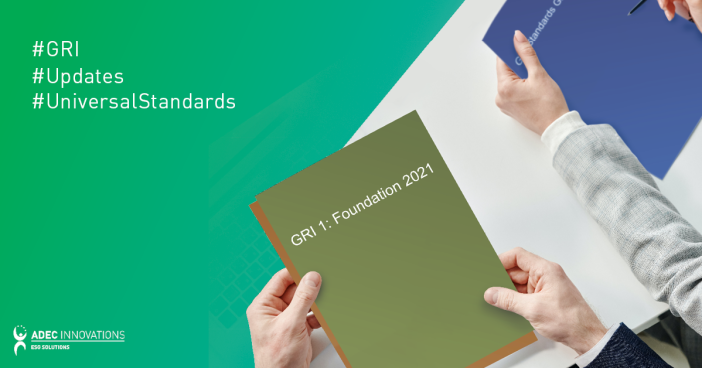Thinking of publishing a sustainability report this year? To communicate clearly with internal and external stakeholders, a meaningful report should align with industry standards—such as those of the GRI, SASB, the UN SDGs, and/or TCFD recommendations. In fact, according to reports from KPMG and the Government and Accountability Institute, 73% of the G250 (the world’s largest 250 companies) and 52% of the Russell 1000 report in conformance with the GRI Standards—and this number continues to grow.
In October 2021, the Global Reporting Initiative (GRI) unveiled a major update to its disclosure standards. The updated system of GRI Standards now consists of three series of Standards: Universal Standards, Sector Standards, and Topic Standards. The revised standards will become effective January 1, 2023, meaning that any company publishing a sustainability report after this date using GRI as a framework should utilize the updated system of standards.
As the most significant update since 2016, the revised standards include clarified guidance on disclosure of material topics, consolidation and streamlining of certain disclosure topics, as well as revised approaches to reporting. Though GRI has announced a handful of significant changes, our three-part series will focus on three key changes that are expected to shift the foundation of a disclosing company’s reporting approach.
Check out part one, Eliminating Core and Comprehensive Options, here.
The change: New alignment of three Universal Standards
One big change to the 2021 GRI Standards is the restructuring of the Universal Standards, which establishes the overall foundation of your CSR report.
The former 101, 102, and 103 series have been replaced by GRI 1, 2, and 3. These Universal Standards apply to all reporting organizations and provide context behind the company, such as its general governance or assurance practices. They also lay out the principles of reporting and provide guidance on how to address material topics.
The revised Universal Standards also include new disclosures on policy commitments for responsible business conduct, including respect for human rights and due diligence, as well as enhanced disclosure on corporate governance practices.
Here is a quick overview of the changes:
GRI 1 (Foundation)
- Introduces new key concepts within the framework (Impact, Material Topics, Due Diligence, Stakeholder)
- Revises the reporting principles (adds Completeness, Sustainability context, and Verifiability; removes Reliability)
-
- Accuracy
- Balance
- Clarity
- Comparability
- Completeness
- Sustainability Context
- Timeliness
- Verifiability
- Replaces core and comprehensive reporting options with a single way of claiming for a report to be in accordance with GRI
- Equivalent to the former 101 series
GRI 2 (General Disclosures)
- Includes new, enhanced disclosures on human rights and corporate governance
- Modifies, reorganizes, and consolidates most 2016 GRI 102 topics
GRI 3 (Material Topics)
- Outlines guidance and revised requirements on how companies should be disclosing material topics
- Concepts outlined are aligned to a mix of disclosures from the former 102 series (for example, 102-47: List of material topics) and 103 series (management approach)
Source: Mapping between the GRI Universal Standards 2021 and the GRI Universal Standards 2016
What this means for reporting companies
With all the new changes to the Universal Standards, let’s take a closer look at GRI 2, since these disclosures reflect the actual information and data pieces required within the contents of your report.
As seen in the way GRI Standards Glossary 2021 defines the terms “impacts1” and “material topics2,” the revised standards embed human rights-related disclosures into the Universal Standards, making disclosure on this topic mandatory. Previously, Human Rights as a topic was an optional disclosure selection if GRI 412 (Human Rights Assessment 2016) was considered a material topic to a company.
In addition, the 2021 Universal Standards require significantly increased disclosures on governance. In 2016, if a company was reporting under GRI’s Core Option, the relevant disclosure was 102-18, which asked for the governance structure of the organization, the highest governance body, and which committees were responsible for ESG topics. Since companies no longer have the option of selecting Core or Comprehensive (see part 1), the reorganized, consolidated, and expanded governance disclosures that are integrated within GRI 2 require companies to granularly report their governance practices, from the committees and composition of the highest governance structure, to how the organization advances the highest governance structures’ collective knowledge on sustainable development.
This can be an opportunity for companies to reevaluate their existing governance practices, assess where they are allocating roles and resources, and whether these current practices are providing value to their ESG strategy and actions. Although companies shouldn’t implement new governance structures just to tick off a checkbox from the GRI disclosure “checklist,” ADEC ESG Solutions increasingly sees ESG further integrated with financial and corporate reporting and responsibilities.
As sustainability becomes a business norm, there is mounting expectation from stakeholders that this topic becomes part of the board’s overall duties and oversight.
1 “effect the organization has or could have on the economy, environment, and people, including on their human rights, which in turn can indicate its contribution (negative or positive) to sustainable development; impacts can be actual or potential, negative or positive, short-term or long-term, intended or unintended, and reversible or irreversible” (GRI Standards Glossary 2021)
2 “topics that represent the organization’s most significant impacts on the economy, environment, and people, including impacts on their human rights” (GRI Standards Glossary 2021)
Read the third and final part of our series, GRI Standards Revisions Part 3: Revising Materiality, where we discuss how the GRI is redefining its approach to materiality and the concept of “material.” Subscribe to our blog updates to get the latest news delivered straight to your inbox.
Want to learn more about how ADEC ESG can help your company take its reporting programs and strategy to the next level? Click here to check out our Disclosure and Reporting team and reach out for more info on our tailored solutions.




